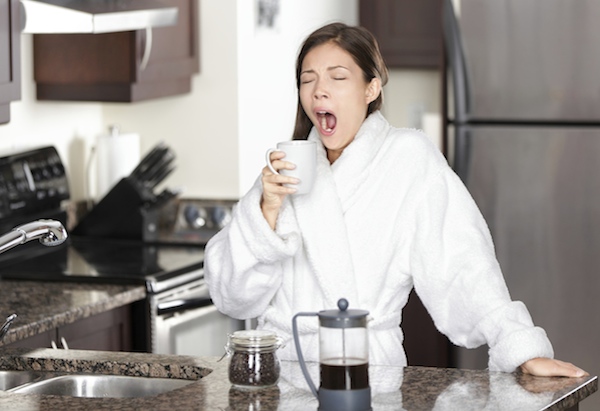Ways to Boost Your Energy When You Haven't Slept
You barely slept at all last night, but playing hooky (from your job, from your family, from your life) today just isn't an option. Here's how to fake it until you make it—until bedtime.

Photo: Thinkstock
7 a.m. Get up when your alarm goes off.
"The worst mistake I see my sleep-deprived insomnia patients make is staying in bed in the morning to try to reach the magic eight hours," says Chad Ruoff, MD, a clinical assistant professor of psychiatry at the Stanford University Sleep Center. Sleeping later than normal throws your body off schedule and will make it harder to fall asleep tonight, perpetuating the problem. No matter how tempting it feels to huddle under the blankets, your body won't react well to a snooze-in—and neither will your boss.
7:10 a.m. Go out on the balcony, the deck or the porch.
"Natural light calibrates your body's clock for the rest of the day," says Michael A. Grandner, PhD, a research associate at the Center for Sleep and Circadian Neurobiology at the University of Pennsylvania. Bright natural sunshine is the strongest and therefore the best, but it's not always easy to find. Bring the sun indoors by turning on all of your lamps, and consider getting a light box that has a couple hundred lux for the dark days of winter, or if you need to consistently get up before the sun.
7:30 a.m. Sip coffee—or sniff it.
Caffeine temporarily interferes with the chemical signals of sleepiness, so we feel more alert, explains Allison T. Siebern, PhD, a sleep specialist at Stanford Sleep Medicine Center and a clinical assistant professor of psychiatry and behavioral science. Not a coffee drinker? Simply breathe in the scent of your spouse's, roommate's or cube-mate's brew. Just the aroma of coffee beans can alter the activity of genes in the brain to reduce the stress of sleep deprivation, found Korean researchers working with exhausted rodents.
7:45 a.m. Rehydrate and refuel.
Most of us wake up dehydrated, which adds to our feelings of fatigue—yet few of us remember to drink a glass of water upon rising. Another habit that will make you feel more alert and boost your cognitive performance is eating breakfast within an hour or so of waking (it works for school kids; it will work for you, too). Any kind of early meal will help, but steel-cut oatmeal is one of your best bets, thanks to complex carbs, which give a slow, steady dose of energy (add raisins—i.e., simple sugar—for the quick surge).
10 a.m. Consider another cup of coffee.
Java junkies can handle about 400 mg of caffeine per day (the equivalent of the amount in a Starbucks venti). Just beware of getting more than 500 mg, which, like sleep deprivation, can lead to nervousness and irritability. Also try to drink your last cup before late afternoon so as not to throw off tonight's sleep.
Next: The cure for the afternoon slump
"The worst mistake I see my sleep-deprived insomnia patients make is staying in bed in the morning to try to reach the magic eight hours," says Chad Ruoff, MD, a clinical assistant professor of psychiatry at the Stanford University Sleep Center. Sleeping later than normal throws your body off schedule and will make it harder to fall asleep tonight, perpetuating the problem. No matter how tempting it feels to huddle under the blankets, your body won't react well to a snooze-in—and neither will your boss.
7:10 a.m. Go out on the balcony, the deck or the porch.
"Natural light calibrates your body's clock for the rest of the day," says Michael A. Grandner, PhD, a research associate at the Center for Sleep and Circadian Neurobiology at the University of Pennsylvania. Bright natural sunshine is the strongest and therefore the best, but it's not always easy to find. Bring the sun indoors by turning on all of your lamps, and consider getting a light box that has a couple hundred lux for the dark days of winter, or if you need to consistently get up before the sun.
7:30 a.m. Sip coffee—or sniff it.
Caffeine temporarily interferes with the chemical signals of sleepiness, so we feel more alert, explains Allison T. Siebern, PhD, a sleep specialist at Stanford Sleep Medicine Center and a clinical assistant professor of psychiatry and behavioral science. Not a coffee drinker? Simply breathe in the scent of your spouse's, roommate's or cube-mate's brew. Just the aroma of coffee beans can alter the activity of genes in the brain to reduce the stress of sleep deprivation, found Korean researchers working with exhausted rodents.
7:45 a.m. Rehydrate and refuel.
Most of us wake up dehydrated, which adds to our feelings of fatigue—yet few of us remember to drink a glass of water upon rising. Another habit that will make you feel more alert and boost your cognitive performance is eating breakfast within an hour or so of waking (it works for school kids; it will work for you, too). Any kind of early meal will help, but steel-cut oatmeal is one of your best bets, thanks to complex carbs, which give a slow, steady dose of energy (add raisins—i.e., simple sugar—for the quick surge).
10 a.m. Consider another cup of coffee.
Java junkies can handle about 400 mg of caffeine per day (the equivalent of the amount in a Starbucks venti). Just beware of getting more than 500 mg, which, like sleep deprivation, can lead to nervousness and irritability. Also try to drink your last cup before late afternoon so as not to throw off tonight's sleep.
Next: The cure for the afternoon slump



